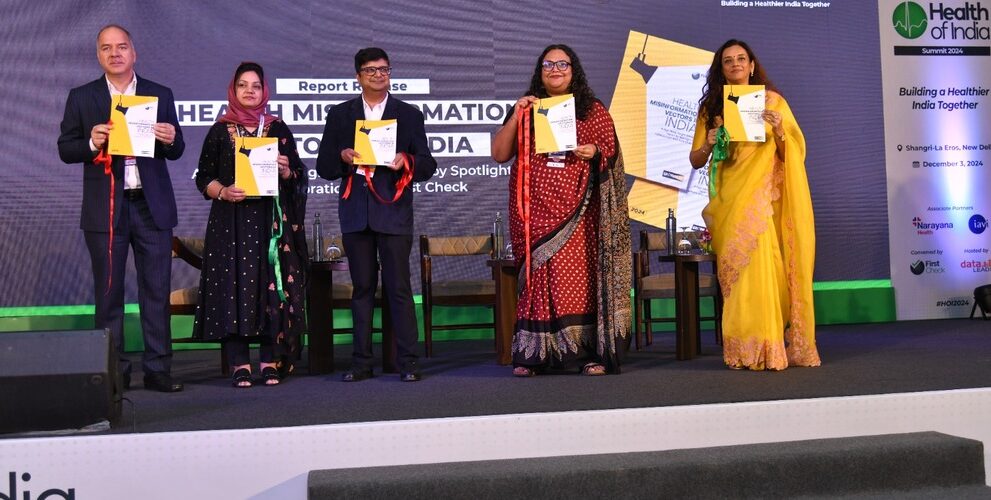AI-fueled health misinformation, infectious diseases and natural remedy myths cause of concern: report
The insight-based report, the culmination of a year-long content monitoring exercise, was prepared by Spotlight, the Trust and Safety, and Data Intelligence Unit of DataLEADS, in collaboration with First Check, a unique health information platform that is safeguarding public health against misinformation
Author
Author
- admin / 1 year

- 0
- 3 min read

Author
The “Health Misinformation Vectors in India” report, released at the Health of India Summit in Delhi, warns of AI-driven misinformation and the rise of infectious diseases like Marburg virus and Mpox, while highlighting a growing shift from evidence-based medicine to natural remedies influenced by local traditions.
“Even on life threatening diseases like cancer, some of the misinformation centred around baseless remedies and theories, can even prove lethal. In sensitive areas like reproductive health, societal pressures and the fear of stigmatization prevents individuals from seeking accurate information or professional care,” the report says.
The insight-based report, the culmination of a year-long content monitoring exercise, was prepared by Spotlight, the Trust and Safety, and Data Intelligence Unit of DataLEADS, in collaboration with First Check, a unique health information platform that is safeguarding public health against misinformation.
The comprehensive report highlights alarming false health narratives circulating on social media in India, examines public perceptions of health conditions, and offers policy insights and recommendations for all stakeholders.
Health Misinformation trends in India
The report highlights key trends in health-related misinformation, examining how it spreads and evades scrutiny. It identifies the proliferation of vaccine misinformation, myths surrounding chronic disease treatments like cancer, and the growing influence of unverified wellness trends.
Analyzing algorithms boosted content from online platforms using keywords associated with the disease in local contexts, the report also highlights the drawbacks in the present social media policies on tackling misinformation. It also provides a roadmap for combating the health infodemic through recommendations for public health communication, policy intervention and health literacy initiatives.
“Health misinformation has far-reaching health consequences, impacting medical decisions, delaying treatments, eroding trust, and even costing lives,” said Dr Sabba Mahmood, Co-Founder of First Check, while adding that “People with a life-threatening disease are particularly vulnerable to misinformation because people are often desperate and willing to try anything to save themselves and their family members.”

Even dangerous claims about abortion through illegal and unproven methods go unchecked on nearly all platforms.
The report finds that while sex determination has been outlawed in the country, the misinformation on how to conceive a male child swirls on social media. “Content like this reinforces gender preferences,” the report adds.
The report urges policymakers to implement stricter regulations on health-related content and strengthen misinformation countermeasures – including introducing an infodemic management curriculum, upskilling and mobilising local health workers, and leveraging tech to increase health literacy. It asks healthcare providers to actively engage in patient education to dispel myths and build community intelligence against misinformation.
“Tech platforms should enhance algorithms to prioritize credible health information and remove harmful content promptly,” the report stresses.
Also read: Persistent threat of health misinformation in a post-pandemic world – An Excerpt From First Check’s Coffee Table Book – First Check









